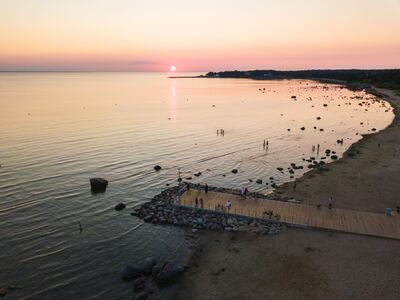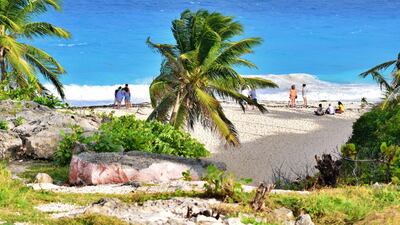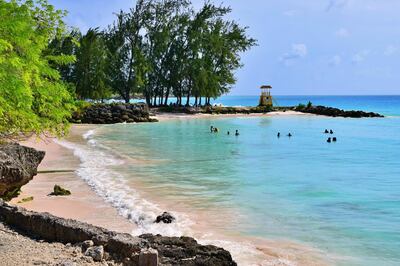Travel restrictions, physical distancing requirements and border closures due to the coronavirus crisis have everyone rethinking how we work and travel.
Experts say that there are more remote workers now than at any time in history and the trend is expected to only continue upwards as companies adjust to socially-distanced set ups.
Some destinations are looking to capitalise on this “new normal” by paving the way for “work tourists” to visit, stay and work remotely in the country for an extended period of time.
For travellers able to work from anywhere and craving a change of scenery, here are three destinations rolling out the welcome mat.
Barbados: 12 months in paradise
If you like the idea of switching your virtual Zoom beach background for the real thing then Barbados’s 12-month welcome stamp might appeal. The Caribbean nation has opened applications for its year-long visa that gives work tourists 12 months of unrestricted access to the island.
Applicants can bring their spouse or partner along, as well as any children or dependents under the age of 26.
“Although the Covid-19 pandemic has been a tremendous challenge to people around the world, we believe it has also opened up opportunities,” said Mia Amor Mottley, Prime Minister of Barbados.
"We recognise more people are working remotely, sometimes in very stressful conditions, with little option for vacation. Our new 12 month Barbados Welcome Stamp is a visa that allows you to relocate and work from one of the world’s most beloved tourism destinations.”
But before you drag out your suitcases, it's worth noting this isn't a free ride.
Tourism is the leading economic sector in Barbados, but Covid-19 restrictions have seen it come to a screeching halt. Flights in and out the country restarted on July 12, but most beaches, hotels, resorts and local businesses remain relatively empty.
Work tourists keen to take advantage of pristine shorelines and coconut palms can apply online for the visa and only need a handful of documents to do so.
But before you drag out your suitcases, it’s worth noting this isn’t a free ride. A non-refundable application fee of $2,000 (Dh7,345) per person, or $3,000 (Dh11,017) per family is required. Applicants also need to commit to earning more than $50,000 (Dh183,625) over the course of the year – which means you’d need to be banking a monthly salary of around Dh15,300.
All travellers headed to Barbados are advised to take a Covid-19 test before travelling. There’s also testing on arrival in place, with 48-hour quarantine periods required until results are ready. Covid levels on the island are low, Barbados has only recorded 108 cases to date.
Estonia: Digital nomad visas
The Baltic country of Estonia is one of the most digitally advanced countries in the world, and remote workers are set to get access to its thriving tech scene with a new visa scheme. The European country is launching a digital nomad visa and plans to issue around 2,000 of them annually.
In an effort to entice more work tourists to the country, Estonian authorities plan to launch the visa to give travellers who are able to work remotely the right to stay in the country for up to one year.
The scheme isn’t up and running yet, but will launch in August. When it does, it will be open to all nationalities, as long as there are no Covid-19 entry restrictions on the country they are coming from.
Applicants for the visa will need to prove they can work independent of location and must earn the monthly income threshold for living in Estonia. That’s currently set at 3,504 euros (Dh15,000) and needs six months of bank statements as proof. All work tourists will also need valid health insurance.
The form is live here and applications are expected take around 15 days once processing starts. The application fee is 100 euros (Dh428).
Estonia offers a great digital infrastructure for nomads and remote workers. It’s also a beautiful place to stay to explore the historic old town of Tallinn, the beaches along the Baltic coastline and the country’s thick forests and rolling hills.
To date, the country has only recorded 2,033 cases of the coronavirus and travellers who qualify for the digital nomad visa will need to follow set rules to prevent the spread of the virus. These include 14-days of self-isolation for anyone arriving from a country where the rate of infection is above 16 per 100,000.
Georgia: Remote worker visas
Already a popular destination with digital nomads, Georgia is seeking to grow its appeal as a work tourism destination with a new visa aimed at remote workers.
Georgia has effectively responded to the coronavirus pandemic, recording only 1,131 cases to date, and authorities are now trying to restart the tourism economy. One way they’re doing this is by opening the borders to select groups of people – among them foreigners looking to work remotely.
The new remote worker visa will allow people from any country to live and work in the Balkan country for up to one year. Applicants must be able to cover the cost of their mandatory 14-day quarantine upon arrival.
More details are yet to be announced, but it is set to start in September when the country is also planning to reopen to international tourism. The online application system will be live here and will ask for personal information, a certificate of employment and proof of valid travel insurance for the duration of the visit.
If you can work remotely and are craving mountains, a climate that rivals the Mediterranean and a low-cost of living, Georgia could be a good pick. And since there’s no discrimination against travellers from countries that are grappling with high numbers of Covid-19, it could also be a safe haven for anyone currently living in an area with a high rate of the virus.
Company profile
Name: Thndr
Started: October 2020
Founders: Ahmad Hammouda and Seif Amr
Based: Cairo, Egypt
Sector: FinTech
Initial investment: pre-seed of $800,000
Funding stage: series A; $20 million
Investors: Tiger Global, Beco Capital, Prosus Ventures, Y Combinator, Global Ventures, Abdul Latif Jameel, Endure Capital, 4DX Ventures, Plus VC, Rabacap and MSA Capital
Recycle Reuse Repurpose
New central waste facility on site at expo Dubai South area to handle estimated 173 tonne of waste generated daily by millions of visitors
Recyclables such as plastic, paper, glass will be collected from bins on the expo site and taken to the new expo Central Waste Facility on site
Organic waste will be processed at the new onsite Central Waste Facility, treated and converted into compost to be re-used to green the expo area
Of 173 tonnes of waste daily, an estimated 39 per cent will be recyclables, 48 per cent organic waste and 13 per cent general waste.
About 147 tonnes will be recycled and converted to new products at another existing facility in Ras Al Khor
Recycling at Ras Al Khor unit:
Plastic items to be converted to plastic bags and recycled
Paper pulp moulded products such as cup carriers, egg trays, seed pots, and food packaging trays
Glass waste into bowls, lights, candle holders, serving trays and coasters
Aim is for 85 per cent of waste from the site to be diverted from landfill
THE%20SWIMMERS
%3Cp%3E%3Cstrong%3EDirector%3A%20%3C%2Fstrong%3ESally%20El-Hosaini%3C%2Fp%3E%0A%3Cp%3E%3Cstrong%3EStars%3A%20%3C%2Fstrong%3ENathalie%20Issa%2C%20Manal%20Issa%2C%20Ahmed%20Malek%20and%20Ali%20Suliman%C2%A0%3C%2Fp%3E%0A%3Cp%3E%3Cstrong%3ERating%3A%20%3C%2Fstrong%3E4%2F5%3C%2Fp%3E%0A
MISSION: IMPOSSIBLE – FINAL RECKONING
Director: Christopher McQuarrie
Starring: Tom Cruise, Hayley Atwell, Simon Pegg
Rating: 4/5
Fifa%20World%20Cup%20Qatar%202022%20
%3Cp%3E%3Cstrong%3EFirst%20match%3A%20%3C%2Fstrong%3ENovember%2020%0D%3Cbr%3E%3Cstrong%3EFinal%2016%20round%3A%20%3C%2Fstrong%3EDecember%203%20to%206%0D%3Cbr%3E%3Cstrong%3EQuarter-finals%3A%20%3C%2Fstrong%3EDecember%209%20and%2010%0D%3Cbr%3E%3Cstrong%3ESemi-finals%3A%20%3C%2Fstrong%3EDecember%2013%20and%2014%0D%3Cbr%3E%3Cstrong%3EFinal%3A%20%3C%2Fstrong%3EDecember%2018%3C%2Fp%3E%0A
The specs: 2018 Audi RS5
Price, base: Dh359,200
Engine: 2.9L twin-turbo V6
Transmission: Eight-speed automatic
Power: 450hp at 5,700rpm
Torque: 600Nm at 1,900rpm
Fuel economy, combined: 8.7L / 100km
Global state-owned investor ranking by size
|
1.
|
United States
|
|
2.
|
China
|
|
3.
|
UAE
|
|
4.
|
Japan
|
|
5
|
Norway
|
|
6.
|
Canada
|
|
7.
|
Singapore
|
|
8.
|
Australia
|
|
9.
|
Saudi Arabia
|
|
10.
|
South Korea
|
UPI facts
More than 2.2 million Indian tourists arrived in UAE in 2023
More than 3.5 million Indians reside in UAE
Indian tourists can make purchases in UAE using rupee accounts in India through QR-code-based UPI real-time payment systems
Indian residents in UAE can use their non-resident NRO and NRE accounts held in Indian banks linked to a UAE mobile number for UPI transactions
UAE currency: the story behind the money in your pockets
Read more from Aya Iskandarani
Dr Afridi's warning signs of digital addiction
Spending an excessive amount of time on the phone.
Neglecting personal, social, or academic responsibilities.
Losing interest in other activities or hobbies that were once enjoyed.
Having withdrawal symptoms like feeling anxious, restless, or upset when the technology is not available.
Experiencing sleep disturbances or changes in sleep patterns.
What are the guidelines?
Under 18 months: Avoid screen time altogether, except for video chatting with family.
Aged 18-24 months: If screens are introduced, it should be high-quality content watched with a caregiver to help the child understand what they are seeing.
Aged 2-5 years: Limit to one-hour per day of high-quality programming, with co-viewing whenever possible.
Aged 6-12 years: Set consistent limits on screen time to ensure it does not interfere with sleep, physical activity, or social interactions.
Teenagers: Encourage a balanced approach – screens should not replace sleep, exercise, or face-to-face socialisation.
Source: American Paediatric Association
The specs
Engine: 3.8-litre, twin-turbo V8
Transmission: eight-speed automatic
Power: 582bhp
Torque: 730Nm
Price: Dh649,000
On sale: now
Scoreline
Real Madrid 1
Ronaldo (53')
Atletico Madrid 1
Griezmann (57')
About Karol Nawrocki
• Supports military aid for Ukraine, unlike other eurosceptic leaders, but he will oppose its membership in western alliances.
• A nationalist, his campaign slogan was Poland First. "Let's help others, but let's take care of our own citizens first," he said on social media in April.
• Cultivates tough-guy image, posting videos of himself at shooting ranges and in boxing rings.
• Met Donald Trump at the White House and received his backing.
How much sugar is in chocolate Easter eggs?
- The 169g Crunchie egg has 15.9g of sugar per 25g serving, working out at around 107g of sugar per egg
- The 190g Maltesers Teasers egg contains 58g of sugar per 100g for the egg and 19.6g of sugar in each of the two Teasers bars that come with it
- The 188g Smarties egg has 113g of sugar per egg and 22.8g in the tube of Smarties it contains
- The Milky Bar white chocolate Egg Hunt Pack contains eight eggs at 7.7g of sugar per egg
- The Cadbury Creme Egg contains 26g of sugar per 40g egg
BMW%20M4%20Competition
%3Cp%3E%3Cstrong%3EEngine%3A%20%3C%2Fstrong%3E3.0%20twin-turbo%20inline%20six-cylinder%0D%3Cbr%3E%3Cstrong%3ETransmission%3A%3C%2Fstrong%3E%20eight-speed%0D%3Cbr%3E%3Cstrong%3EPower%3A%20%3C%2Fstrong%3E503hp%0D%3Cbr%3E%3Cstrong%3ETorque%3A%3C%2Fstrong%3E%20600Nm%0D%3Cbr%3E%3Cstrong%3EPrice%3A%3C%2Fstrong%3E%20from%20Dh617%2C600%0D%3Cbr%3E%3Cstrong%3EOn%20sale%3A%3C%2Fstrong%3E%20Now%0D%3C%2Fp%3E%0A
What%20is%20Dungeons%20%26%20Dragons%3F%20
%3Cp%3EDungeons%20%26amp%3B%20Dragons%20began%20as%20an%20interactive%20game%20which%20would%20be%20set%20up%20on%20a%20table%20in%201974.%20One%20player%20takes%20on%20the%20role%20of%20dungeon%20master%2C%20who%20directs%20the%20game%2C%20while%20the%20other%20players%20each%20portray%20a%20character%2C%20determining%20its%20species%2C%20occupation%20and%20moral%20and%20ethical%20outlook.%20They%20can%20choose%20the%20character%E2%80%99s%20abilities%2C%20such%20as%20strength%2C%20constitution%2C%20dexterity%2C%20intelligence%2C%20wisdom%20and%20charisma.%20In%20layman%E2%80%99s%20terms%2C%20the%20winner%20is%20the%20one%20who%20amasses%20the%20highest%20score.%3C%2Fp%3E%0A
Hales' batting career
Tests 11; Runs 573; 100s 0; 50s 5; Avg 27.38; Best 94
ODIs 58; Runs 1,957; 100s 5; 50s 11; Avg 36.24; Best 171
T20s 52; Runs 1,456; 100s 1; 50s 7; Avg 31.65; Best 116 not out
Diriyah%20project%20at%20a%20glance
%3Cp%3E-%20Diriyah%E2%80%99s%201.9km%20King%20Salman%20Boulevard%2C%20a%20Parisian%20Champs-Elysees-inspired%20avenue%2C%20is%20scheduled%20for%20completion%20in%202028%3Cbr%3E-%20The%20Royal%20Diriyah%20Opera%20House%20is%20expected%20to%20be%20completed%20in%20four%20years%3Cbr%3E-%20Diriyah%E2%80%99s%20first%20of%2042%20hotels%2C%20the%20Bab%20Samhan%20hotel%2C%20will%20open%20in%20the%20first%20quarter%20of%202024%3Cbr%3E-%20On%20completion%20in%202030%2C%20the%20Diriyah%20project%20is%20forecast%20to%20accommodate%20more%20than%20100%2C000%20people%3Cbr%3E-%20The%20%2463.2%20billion%20Diriyah%20project%20will%20contribute%20%247.2%20billion%20to%20the%20kingdom%E2%80%99s%20GDP%3Cbr%3E-%20It%20will%20create%20more%20than%20178%2C000%20jobs%20and%20aims%20to%20attract%20more%20than%2050%20million%20visits%20a%20year%3Cbr%3E-%20About%202%2C000%20people%20work%20for%20the%20Diriyah%20Company%2C%20with%20more%20than%2086%20per%20cent%20being%20Saudi%20citizens%3Cbr%3E%3C%2Fp%3E%0A
RESULTS
2pm: Handicap (PA) Dh40,000 (Dirt) 1,200m
Winner: Najem Al Rwasi, Fabrice Veron (jockey), Ahmed Al Shemaili (trainer)
2.30pm: Handicap (PA) Dh40,000 (D) 2,000m
Winner: Fandim, Fernando Jara, Majed Al Jahouri
3pm: Maiden (PA) Dh40,000 (D) 1,700m
Winner: Harbh, Pat Cosgrave, Ahmed Al Mehairbi
3.30pm: Maiden (PA) Dh40,000 (D) 1,700m
Winner: Wakeel W’Rsan, Richard Mullen, Jaci Wickham
4pm: Crown Prince of Sharjah Cup Prestige (PA) Dh200,000 (D) 1,200m
Winner: Jawaal, Fernando Jara, Majed Al Jahouri
4.30pm: Sheikh Ahmed bin Rashid Al Maktoum Cup (TB) Dh200,000 (D) 2,000m
Winner: Tailor’s Row, Royston Ffrench, Salem bin Ghadayer
Score
New Zealand 266 for 9 in 50 overs
Pakistan 219 all out in 47.2 overs
New Zealand win by 47 runs
New Zealand lead three-match ODI series 1-0
Next match: Zayed Cricket Stadium, Abu Dhabi, Friday
Key facilities
- Olympic-size swimming pool with a split bulkhead for multi-use configurations, including water polo and 50m/25m training lanes
- Premier League-standard football pitch
- 400m Olympic running track
- NBA-spec basketball court with auditorium
- 600-seat auditorium
- Spaces for historical and cultural exploration
- An elevated football field that doubles as a helipad
- Specialist robotics and science laboratories
- AR and VR-enabled learning centres
- Disruption Lab and Research Centre for developing entrepreneurial skills
MATCH INFO
FA Cup final
Chelsea 1
Hazard (22' pen)
Manchester United 0
Man of the match: Eden Hazard (Chelsea)
THE BIO
Mr Al Qassimi is 37 and lives in Dubai
He is a keen drummer and loves gardening
His favourite way to unwind is spending time with his two children and cooking
The 12 Syrian entities delisted by UK
Ministry of Interior
Ministry of Defence
General Intelligence Directorate
Air Force Intelligence Agency
Political Security Directorate
Syrian National Security Bureau
Military Intelligence Directorate
Army Supply Bureau
General Organisation of Radio and TV
Al Watan newspaper
Cham Press TV
Sama TV
COMPANY%20PROFILE
%3Cp%3E%3Cstrong%3EName%3A%20%3C%2Fstrong%3EKinetic%207%3Cbr%3E%3Cstrong%3EStarted%3A%3C%2Fstrong%3E%202018%3Cbr%3E%3Cstrong%3EFounder%3A%3C%2Fstrong%3E%20Rick%20Parish%3Cbr%3E%3Cstrong%3EBased%3A%3C%2Fstrong%3E%20Abu%20Dhabi%2C%20UAE%3Cbr%3E%3Cstrong%3EIndustry%3A%3C%2Fstrong%3E%20Clean%20cooking%3Cbr%3E%3Cstrong%3EFunding%3A%3C%2Fstrong%3E%20%2410%20million%3Cbr%3E%3Cstrong%3EInvestors%3A%3C%2Fstrong%3E%20Self-funded%3C%2Fp%3E%0A
In-demand jobs and monthly salaries
- Technology expert in robotics and automation: Dh20,000 to Dh40,000
- Energy engineer: Dh25,000 to Dh30,000
- Production engineer: Dh30,000 to Dh40,000
- Data-driven supply chain management professional: Dh30,000 to Dh50,000
- HR leader: Dh40,000 to Dh60,000
- Engineering leader: Dh30,000 to Dh55,000
- Project manager: Dh55,000 to Dh65,000
- Senior reservoir engineer: Dh40,000 to Dh55,000
- Senior drilling engineer: Dh38,000 to Dh46,000
- Senior process engineer: Dh28,000 to Dh38,000
- Senior maintenance engineer: Dh22,000 to Dh34,000
- Field engineer: Dh6,500 to Dh7,500
- Field supervisor: Dh9,000 to Dh12,000
- Field operator: Dh5,000 to Dh7,000
%20Ramez%20Gab%20Min%20El%20Akher
%3Cp%3E%3Cstrong%3ECreator%3A%3C%2Fstrong%3E%20Ramez%20Galal%3C%2Fp%3E%0A%3Cp%3E%3Cstrong%3EStarring%3A%3C%2Fstrong%3E%20Ramez%20Galal%3C%2Fp%3E%0A%3Cp%3E%3Cstrong%3EStreaming%20on%3A%20%3C%2Fstrong%3EMBC%20Shahid%3C%2Fp%3E%0A%3Cp%3E%3Cstrong%3ERating%3A%20%3C%2Fstrong%3E2.5%2F5%3C%2Fp%3E%0A
New Zealand 21 British & Irish Lions 24
New Zealand
Penalties: Barrett (7)
British & Irish Lions
Tries: Faletau, Murray
Penalties: Farrell (4)
Conversions: Farrell
RESULTS
6pm: Al Maktoum Challenge Round-2 – Group 1 (PA) $55,000 (Dirt) 1,900m
Winner: Rajeh, Antonio Fresu (jockey), Musabah Al Muhairi (trainer)
6.35pm: Oud Metha Stakes – Rated Conditions (TB) $60,000 (D) 1,200m
Winner: Get Back Goldie, William Buick, Doug O’Neill
7.10pm: Jumeirah Classic – Listed (TB) $150,000 (Turf) 1,600m
Winner: Sovereign Prince, James Doyle, Charlie Appleby
7.45pm: Firebreak Stakes – Group 3 (TB) $150,000 (D) 1,600m
Winner: Hypothetical, Mickael Barzalona, Salem bin Ghadayer
8.20pm: Al Maktoum Challenge Round-2 – Group 2 (TB) $350,000 (D) 1,900m
Winner: Hot Rod Charlie, William Buick, Doug O’Neill
8.55pm: Al Bastakiya Trial – Conditions (TB) $60,000 (D) 1,900m
Winner: Withering, Adrie de Vries, Fawzi Nass
9.30pm: Balanchine – Group 2 (TB) $180,000 (T) 1,800m
Winner: Creative Flair, William Buick, Charlie Appleby





